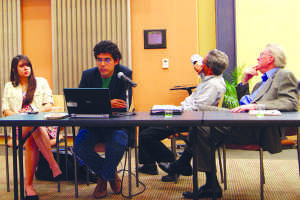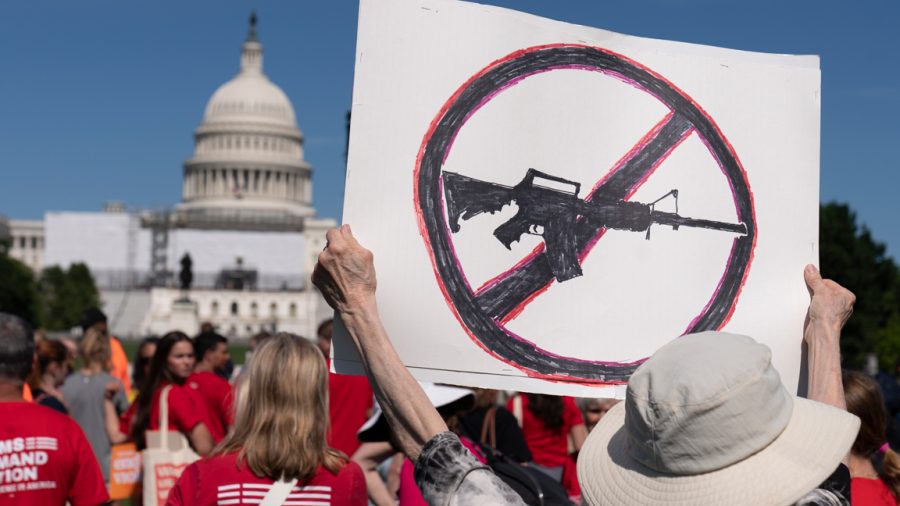 This Tuesday saw the Political Science Department, Political Science Club and Associated Students (AS) of Cal State East Bay host a question and answer forum centered on next week’s upcoming midterm election next Tuesday.
This Tuesday saw the Political Science Department, Political Science Club and Associated Students (AS) of Cal State East Bay host a question and answer forum centered on next week’s upcoming midterm election next Tuesday.
The forum, held in the multipurpose room of the new University Union, was divided between a series of five panel speakers and an open question -and-answer.
CSUEB political science professors Dr. Kim Geron, Dr. David Baggins and Dr. Michael Good focused on a variety of hot button issues that affect political currents at the local, state and national levels.
Good discussed the rise of the nationwide Tea Party Movement and the motivations that surrounded the choice by Americans to affiliate with this “loose movement of aligned interests.”
Good tore into Tea Party affiliates for espousing a political allegiance which, in his characterization, thrived on “misinformation” and functions as an “arm” of the Republican Party.
The professor took the assembled audience on a tour of facts and statistics which, in his opinion, counter accusations by Tea Partiers that the Obama Administration has tripled the deficit and worked to create unsustainable “socialized” health care reform.
As a parting shot, Good characterized the majority of Tea Party opposition to Obama as objections based on racism.
“The vast majority of opposition to Obama is based on race. They [the Tea Party movement] do not want to see a black man in the White House,” said Good.
Professors Baggins and Good focused their presentations on California politics and the unique concerns that come with residing in the Golden State.
Baggins centered his comments on Proposition 19, the measure on the California ballot which would both legalize and tax the use of marijuana. Currently marijuana is banned as an illicit substance by the federal government.
Instead of weighing the social merits or disadvantages of passing Prop. 19, Baggins focused on the amount of polling data and air time devoted to Prop 19 by local, national, and worldwide media.
“There have been more polls created about Prop 19 than all other initiatives,” said Baggins. The professor characterized the focus on propositions by the media as indicative of the ability of voter to find something absolute to like or absolute to dislike.
“There’s nothing more interesting than politics and props are more interesting than candidates,” said Baggins.
The professor also described how voting blocs, such as the African-American vote, can be split on an issue such as Prop. 19 on the basis age, religious, and cultural values.
Geron took up the issue of the rise of the Latino voter in California. The trend, as the professor sees it, is towards a California where a vibrant Latino population could hold the balance of power in the current election and into the future.
The professor used the example of the Latino voter to expound upon a population trend which leaves the majority of California populated by non-white residents. In addition, the professor detailed how the Democratic lean of the growing Latino population works to keep the state blue.
Over 60 percent of Latino voters are registered Democrats, compared to a nearly even Democrat and Republican split among white voters.
The tail end of the presentation portion saw AS Director of Legislative Affairs Samantha Calderon and AS Vice President of External Affairs Joe Tafoya talk respectively about the gubernatorial election and voting trends among youth.
Calerdron argued the merits and deficiencies of Democratic gubernatorial candidate Jerry Brown and Republican gubernatorial candidate Meg Whitman. The Leg. Affairs director closed her comments with an appeal to the audience assembled to journey to the ballot box to cast an educated vote.
“Many of you are not going to vote, you are looking for what you need. Think about who you want to check off [when you vote],” said Calderon. “Don’t do it for the hell of it.”
Tafoya showed the audience a Powerpoint that shows the relationship between education level and youth participation in voting. The more education a young voter had, the more likely they were to go to the polls.
“Those who go out to the polls in their college years are more likely to continue voting as they grow older,” said Tafoya.
Immediately after the presentation portion, the question-and-answer session drew in audience participation from various audience members, of multiple political viewpoints.
A slew of questions directed at the panel regarding clarifications, specific information as well as a pair of quasi-question monologues by Tea Party sympathizers that tore into Professor Good’s characterization of the Tea Party movement as a negative influence on the American polity.
The Pioneer put before the panel a question regarding which of the two gubernatorial candidates, Brown or Whitman, was stronger for the interests of public higher education.
The surprising consensus reached by the panel was that neither candidate has emerged as a clear champion of public higher education.
Geron said, “Whitman wants to reduce pensions and has supported a reduction in state employment by 40,000. Brown has been silent on the issue of public higher education.”
Geron also warns that with Republicans focused on tax breaks and Democrats focused on social welfare services, the day of college and university services being farmed out to business is soon. “The day of for-profit education is coming soon,” said Geron.
Good points out that both Republicans and Democrats are constrained by the reductions in state revenues. At the end of the day, he also adds that Democrats are better suited to holding the line for public education interests if the state could find new or enlarged revenue streams.
Finally, Tafoya characterized the choice between Brown and Whitman as a toss up.
“Students have to choose the lesser of the two evils. Both candidates aren’t the ones we want to see in play.”











